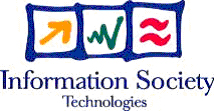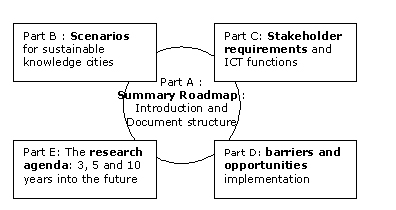 |
 |
 |
 |
 |
 |
Framework summary

Name of the Framework
INTELCITY
Brief description of the framework and tools within it
INTELCITY explores new opportunities for sustainable development of cities through the intelligent use of Information and Communication Technologies (ICTs). It integrates the knowledge of experts in sustainable urban development (SUD) and ICTs to deliver a roadmap that relates the range of potential ICT development options to planning and urban re/development processes.
The roadmap lays out the INTELCITY vision of an integrated open-system city platform (IOSCP) intelligent information system to support the knowledge society (KS) and sustainable development of cities (SUD).
INTELCITY deals with support activities as ICT´s for Urban Representation, Geographical Informative System, Databases, Modelling and Simulation, Communication and Real Time Aspects and the Integration of all of them, ...
Specific topic focussed on by framework
INTELCITY is dealing with sustainable knowledge city; information and communication technologies.
Web link
http://www.scri.salford.ac.uk/intelcity/home/home.htm
How are the tools organised within the framework?
The main outcome, or tool of INTELCITY is the roadmap that addresses the parallel EU policy objectives of the "Knowledge Society" (KS) by 2010 and "Sustainable Development" (SD) by 2030 through an integrated research strategy towards the intelligent city* that will enable more inclusive decision-making and support more sustainable life-styles.
The roadmap combines a range of scenarios for future sustainable information cities (e-democracy city, virtual city, environment city, etc.), key scenarios research challenges and a city-wide information system.
The research strategy proposes a range of prototyping studies in a number of EU cities aimed at developing "Knowledge Society" and "Sustainable Development" at the city scale by focusing on a range of citizens´ and business" concerns about engagement with decision-making over the (re)generation and management of their local built environment.

* Intelligent City : an integrated citywide ICT information system continuously accessible to all (planners, developers, politicians, designers, engineers, transport and utility service providers AND individual citizens)
Sector/s covered by framework
Waste |
Energy |
Water |
Transport |
Green/Blue |
Building & land use |
0 | 0 | 0 | 0 | 0 | M |
What language/s is the framework available in?
The roadmap is available in English only
What organisation developed the framework and in what country?
INTELCITY research project is supported by the European Commission under the Fifth Framework Programme (IST-2001-37373)
Project partners are: University of Saltford (UK, project coordinator), CSTB (Fr), VTT (Fi), ITAS (De), IOER (De), ESI (Free University of Amsterdam, NL), TaeD (University of Florence, It), Polytechnic of Turin (It), Napier University (Edinburgh, UK), UWE (Bristol, UK).
Partners:
http://ndmodelling.scpm.salford.ac.uk/intelcity/members/partners.htm
Where is the framework available from?
http://www.scri.salford.ac.uk/intelcity/home/home.htm
Steve Curwell,
INTELCITY, BUHU, Bridgewater Building, University of Salford, UK.
E mail: s.r.curwell@salford.ac.uk
Tel.: +44 (0)161 295 4622, Fax.: +44 (0)161 295 5011
What are the strengths of the framework?
The proposed strategy extends beyond the current state of art in the provision of city information, through a process that provides citizens, business and city managers with "intelligent environments" that supports more inclusive and educational planning processes. Ultimately it is hoped that this will provide a much more rapid and consensual decision-making process.
The identification of scenarios by experts is a mean of establishing and linking a range of visions that they explicit links between ICTs and Sustainable Development.
The credibility of the project"s outcomes is supported by the wide range of think-tank involved in the project: 23 city authorities, 20 ICT companies and over 50 research groups.
What are the weaknesses of the framework?
Even if project partners have made an important effort to summarise information generated in a concise manner, it takes some times to assimilate concepts for a non-specialist.
What other interesting information is available about the framework?
Intelcity outcomes aims at achieving the parallel EU policy goals of the Knowledge Society (KS) by 2010 and Sustainable Development 5SD) by 2030.